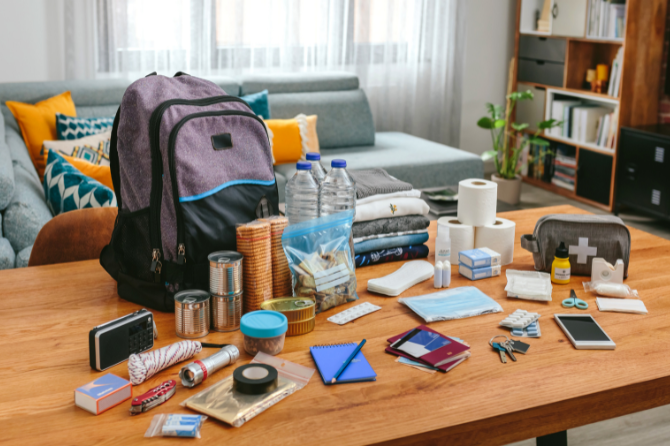
Introduction
In life, accidents and medical emergencies happen when we least expect them. Whether you’re dealing with a sudden illness, an allergic reaction, or a chronic condition flare-up, being prepared can make all the difference. In this guide, we’ll explore the crucial steps to ensure you’re ready for unexpected medical situations. From keeping vital information handy to packing a well-prepared overnight bag and leveraging technology like your phone’s Medical ID, OakBend is here to help. Plus, we’ll introduce you to OakBend’s Emergency Rooms, a valuable resource for your emergent needs.
Education and Awareness
The first step in preparedness is education and awareness. Understand common medical emergencies, such as heart attacks, strokes, severe allergic reactions, choking, and more. Learn the signs and symptoms associated with these conditions so you can recognize them in yourself or others. Consider taking basic first aid and CPR courses, which are often offered by local organizations or online platforms. Stay informed about local emergency resources and services. Know when to visit an emergency room or an urgent care center. Familiarize yourself with local emergency phone numbers and the quickest route to the nearest medical facility. Being informed can save valuable time during a medical emergency.
What Information Should I Keep Handy?
In a medical emergency, time is of the essence. Having essential information readily available in a bag or in one designated spot can greatly aid healthcare professionals and improve the quality of care. Here’s what you should keep handy:
- Personal Identification: Ensure you have your driver’s license or identification card within reach. You can also keep photocopies or electronic copies of your ID or passport as a backup. This helps establish your identity and streamline administrative processes.
- Medical Insurance Details: Keep a copy of your insurance card, along with any relevant policy numbers. This ensures that you receive the appropriate coverage and billing information is readily accessible.
- List of Medications: Create a list of all medications you’re currently taking, including dosages and frequencies. Mention any allergies and adverse reactions you may have experienced in the past.
- Emergency Contacts: Maintain an updated list of emergency contacts, including family members, close friends, and your primary care physician’s contact information.
- Medical History: Document your medical history, including existing conditions, surgeries, and major illnesses. Having this information can help medical professionals make informed decisions about your care.
- Advance Directives: If you have an advance healthcare directive or living will, ensure it’s easily accessible. These legal documents outline your medical preferences in case you’re unable to communicate them.
What Should I Pack in an Overnight Bag?
In many medical emergencies, you may need to spend some time in the hospital for observation or treatment. Having an overnight bag prepared can make this transition smoother for you and your loved ones. Here’s what you should include:
- Clothing: Pack comfortable clothing, such as pajamas, a change of underwear, and socks. Choose items that are easy to put on and take off.
- Toiletries: Include essentials like a toothbrush, toothpaste, soap, shampoo, and a comb or brush. Don’t forget any specialized toiletries you may require.
- Medications: Bring a supply of your essential medications, even if you think you’ll only be away for a short time. It’s crucial to have them on hand.
- Personal Items: Consider packing items like eyeglasses, hearing devices, dentures, and phone / tablet chargers.
- Entertainment: Bring a book, magazine, or any other form of entertainment to pass the time during your stay.
- Comfort Items: A small pillow, a blanket, or a stuffed animal can provide comfort and familiarity during a hospital stay.
- Feminine Hygiene Products: For individuals who may require them, having sanitary pads or tampons in your bag ensures that you or anyone with you is well-equipped for any situation.
How Can I Use Technology to Help in Such a Situation?
In the digital age, our smartphones can be valuable tools during a medical emergency. Here are a few tips to help you use your phone’s medical capabilities:
- Medical ID/Information: Most smartphones allow you to set up a Medical ID or Information section. This feature enables first responders to access critical medical information, even if your phone is locked. Include details like allergies and reactions, emergency contacts, and medical conditions. For an example on how to set up Medical ID on iPhones, click here.
- Emergency Contacts: Ensure that your phone’s contact list includes clearly labeled “ICE” (In Case of Emergency) contacts. This makes it easier for medical professionals to reach your loved ones quickly.
- Health Apps: Many health and fitness apps can store medical information and track vital signs. Consider using apps that allow you to share data with healthcare providers in real-time.
- Location Services: In some cases, your phone’s GPS can help first responders locate you more accurately, especially if you’re in an unfamiliar area.
By taking advantage of these technological features, you can enhance your preparedness for a medical emergency and provide healthcare providers with essential information.
Benefits of Accessible Medical Information During Emergencies
- Faster, Informed Treatment: Having medical information readily accessible allows healthcare providers to make informed decisions quickly, potentially saving precious time during a critical moment.
- Allergy and Medication Awareness: Immediate access to allergy and medication details prevents adverse drug interactions and allergic reactions, ensuring patient safety.
- Enhanced Patient Care: Complete medical histories and records enable healthcare professionals to tailor treatment plans to the patient’s unique needs, optimizing care quality.
- Reduced Risk: Improved patient understanding of medical conditions and preferences reduces the risk of medical errors, enhancing overall safety.
Conclusion
Being prepared for medical emergencies is a proactive step that can help save valuable time, reduce stress, and increase the chances of quick and effective medical treatment. By staying up to date on common medical emergencies, keeping vital information readily available, packing an overnight bag, and utilizing smartphone technology, you can navigate unexpected medical situations with greater ease.
For expert emergency care and support in your time of need, you can rely on OakBend’s Emergency Rooms, where experienced healthcare providers are ready to assist you no matter what time of day. Stay safe and stay prepared.
Leave a reply








